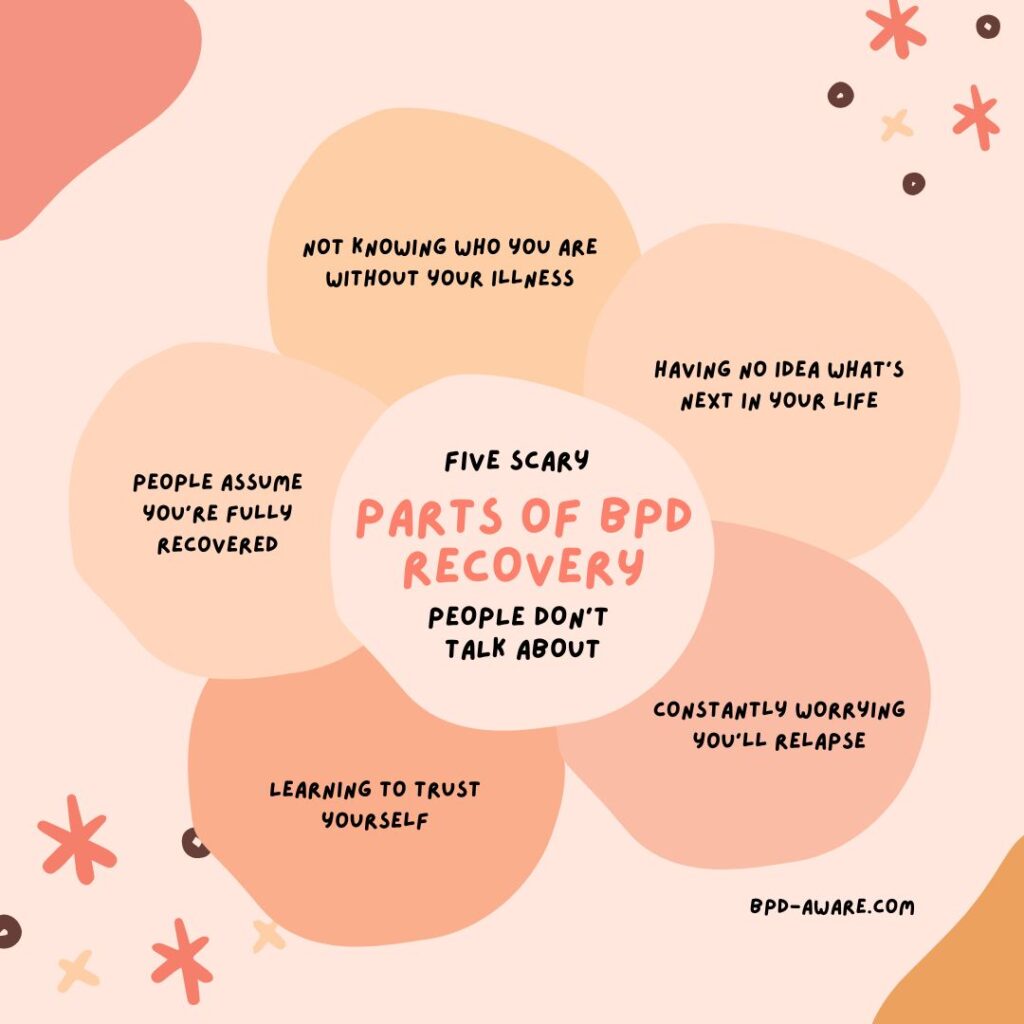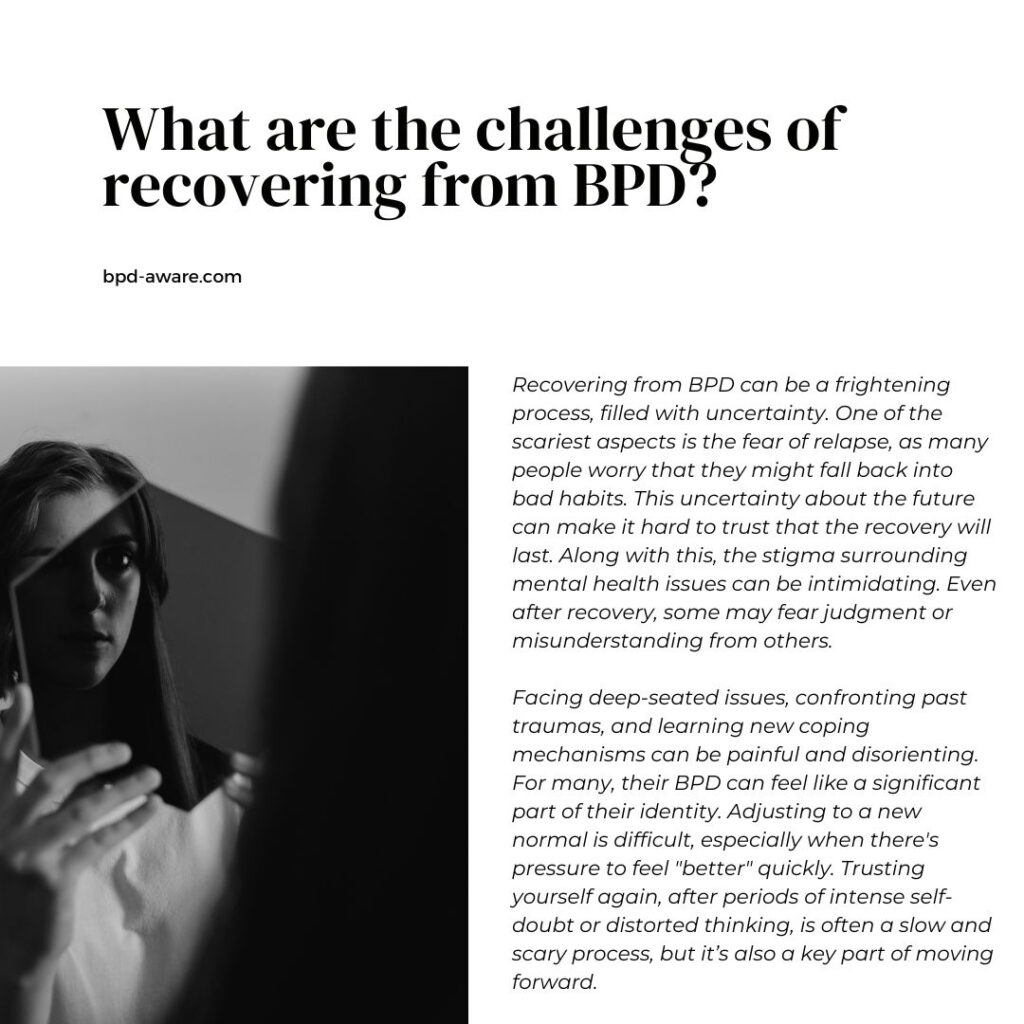On the surface, the idea of recovering from Borderline Personality Disorder (BPD) sounds like a dream scenario. Gone are all those nasty symptoms that have been dragging you down and making you feel awful for all those years. What could be scary about living a life with healthier, more positive thought patterns and behaviors?
As it turns out, quite a lot. While recovering from BPD should always be the end goal for those of us who’ve experienced the condition, recovery itself has unique challenges. Beyond the years of hard work, you have to undergo to no longer meet the criteria for having Borderline Personality Disorder, even the light at the end of the tunnel is tinged with the potential for darkness.
As someone who has recovered from BPD, I know how difficult life can be even after recovery. Once you’re officially considered to be recovered, it no longer feels like the end. It feels like a whole new beginning. And beginnings can be full of anxiety and worry.
Here are some of the scary parts you might experience once you make a recovery from BPD.
Worrying That You’ll Relapse
Healing isn’t linear. There will be ups and downs until things gradually smooth out and move in a consistently positive direction. However, during those down moments – and even sometimes during the quiet moments – you might worry that a relapse is imminent. Could all those years of therapy sessions, skills training, and personal development suddenly become undone?
It’s a real worry and relapses can happen. The important thing to remember is that down moments happen, and sometimes relapses can happen too, but you have picked yourself up once and can do it again if you need to.
Adjusting To A New Normal
BPD is many things but it’s rarely boring. The constant rollercoaster of emotions and the wild swings in your life they can cause can create a great deal of drama and, dare I say, excitement. When you recover from BPD, things begin to feel a lot more calm, and a lot more stable. You might still have the occasional bad day but they’ll be much less frequent than they used to be and less intense.
Sometimes, things can begin to feel a little…boring. You might even start to miss the drama that surrounded you when you had BPD.
There are also new healthier habits, routines, and coping mechanisms you must keep on top of. They might feel like a lot of work at times and you might not always have the desire to do the things you need to do to be in the right mindset. This is another normal part of recovery that many of us struggle with.
Not Knowing Who You Are Without Your BPD
BPD can leave you not knowing who you are. It’s such a big part of your personality that, once it’s gone, you feel a certain void inside you. Gone is the instability, the untold passion, the dizzying highs, and the terrifying lows. Without them, you might struggle to form your true identity. There might be a nagging sense of doubt over who you are.
This can be a real struggle for people who’ve recovered from BPD as their trauma and mental health disorder have already left them with identity issues.
Not Knowing What’s Next In Life
If you’ve had BPD, it’s likely held you back from living the type of life your peers have. Many people with BPD drop out of college, unable to cope with the pressures of student life. They then struggle to hold a job, let alone start a career.
Likewise, relationships are challenging for people with BPD. The constant instability can push away friends, family, and partners.
Once you’ve recovered from BPD, you might not have a lot behind you. When I made my recovery I was in my 30s with no college degree, no steady job, and no idea what I wanted to do with the rest of my life. Even now, years on, I’m still struggling with this. I feel so far behind my peers that I don’t know if I can ever catch up. All I can do is keep moving forward and keep searching.
Missing Your Unhealthy Coping Habits
Most people with BPD have a range of unhealthy coping habits they rely on to make them feel better when they’re struggling the most. It may be hypersexuality, self-harm, substance abuse, addiction, eating disorders, or something else but most of us have them.
And the dirty little secret is that, even after recovery, there are times we miss these habits. We miss the thrill of doing something bad or taboo that we know is harmful to ourselves. This isn’t just true of people with BPD, it’s true of everyone. Even healthy eaters sometimes want to gorge themselves on junk food.
But we must remain disciplined, stick to our new, healthy coping mechanisms, and put the past behind us. Those longings for the bad old days do eventually fade away.

Becoming More Independent
It’s hard to be truly independent when you have BPD. The condition makes it difficult to hold down employment, thus leaving us financially dependent on the state, a parent, or a partner. BPD can also find ways to rob you of important life skills that other people take for granted.
But part of recovery is becoming more independent, relying on yourself rather than others to dig you out of the potholes that you come across in life. Knowing you’re responsible now for your financial well-being, your day-to-day living, as well as keeping your mental health in check is incredibly daunting and can put a great deal of pressure on you.
Remember though, becoming more independent doesn’t mean you have to do everything alone. You can still reach out for help when you need it. Don’t expect yourself to be able to go from completely dependent on others to 100% independent quickly. Firstly, no one is truly 100% independent and secondly, it will take time to gain the experience and skills you need to take care of yourself.
People Checking In On You Less
If you’ve had a good support network throughout your recovery process, it can be scary when you notice that your friends and family aren’t checking in with you as much as they used to. It might even stir up those old worries of being abandoned.
This is a sign that the people who are important to you have seen the progress you’ve made and trust you to be able to take care of yourself without as much support as you once needed. This is a sign that you’re becoming more independent and not something to worry about.
No one loves you less because you’ve recovered and you can still ask for their help and support when you need it.
Learning To Trust Yourself
Others may have begun to trust you to live more independently but you still need to learn to trust yourself. Those early days of recovery are fraught with self-doubt. You’ll likely feel somewhat like a child who’s been thrust into a whole new world, scared and vulnerable.
Living with BPD makes it difficult to trust your thoughts, feelings, and judgments.
But as you celebrate your small victories and learn from your mistakes, you will begin to have more trust in yourself. This is trust in your recovery, trust in your abilities, and trust in your future.
People Assuming You’re Fully Recovered Now
Even after recovering from BPD, some ghosts will remain inside your head. There will be occasional blips, setbacks and maybe even relapses in your recovery.
Once you’ve recovered, some people may assume that everything is fine and “normal” with you. They might even begin to treat you a little worse than they used to because they don’t think that it matters as much anymore. A friend who might have never canceled a meet-up with you because they knew how much it’d hurt you might now assume that it’s no big deal if they cancel at the last minute.
No matter how “recovered” you are, those old triggers can still hurt. But, you now have the skills and ability to cope with these things much better than you used to.

Final Thoughts
Recovering from BPD can be a frightening process, filled with uncertainty. One of the scariest aspects is the fear of relapse, as many people worry that they might fall back into bad habits. This uncertainty about the future can make it hard to trust that the recovery will last.
Facing deep-seated issues, confronting past traumas, and learning new coping mechanisms can be painful and disorienting. For many, their BPD can feel like a significant part of their identity. Trusting yourself again, after periods of intense self-doubt or distorted thinking, is often a slow and scary process, but it’s also a key part of moving forward.
If you’ve successfully recovered from BPD, what were some of the scariest parts of the recovery for you? Or, if you currently have BPD, what is it about the prospect of recovering that scares you the most? Let us know in the comment section below.
Sources, Resources, and Further Reading
- Gary’s story – the long road to BPD diagnosis: https://www.rethink.org/news-and-stories/blogs/2022/12/gary-s-story-the-long-road-to-bpd-diagnosis/
- A BPD Recovery Success Story: https://www.jadestanton.com/blog/bpdrecoverysuccesstory
- BPD Relapse and Recovery: https://www.nami.org/personal-stories/bpd-relapse-and-recovery/
- Living with borderline personality disorder – Rachel’s story: https://www.rethink.org/news-and-stories/blogs/2023/07/living-with-borderline-personality-disorder-rachels-story/
















